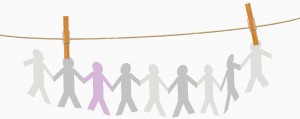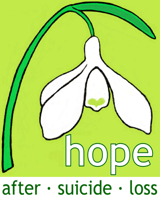Suicide is often misunderstood, complex and is recognised as a psychological trauma. This fact is reflected in the intensity and duration of grief experienced by those survivors profoundly affected by the last act of someone they love.
There still exists genuine confusion amongst society when trying to identify the differences between this bereavement and other loss. The information below is intended to give better clarification with the hope it will translate as better support for survivors in the future.
* Note – Survivors will experience many but not all of the following – In no particular order –
Anniversaries can evoke strong emotions in all loss but a survivor must learn to live with the realisation if a different decision was made on the day their loved one could still be alive. . This painful truth applies to birthdays, Christmas, etc.
Depression – This is far more likely to be accompanied by suicidal thinking and for many survivors, a plan develops so suicide may become a viable option.
Guilt is part of all grief but is far more pronounced in suicide loss. Survivors often believe they should have ‘’prevented the preventable’ and because they didn’t they are somehow flawed.
The Survivor’s Mind – goes into overdrive and the risk of becoming mentally exhausted is real. A survivor’s thought process travels in one continuous loop, with no off switch available and little respite it demands continuous attention and is mentally exhausting. Not surprisingly, many survivors feel they are ‘losing the plot’, going slightly mad, and fear they will never have clarity or peace of mind again.
This grief is sometimes referred to as obsessive and can manifest itself in many ways during suicide bereavement. Survivors may research the route the person took to die with the ultimate aim of discovering how long and how much pain was incurred. This quest is difficult to share with non-survivors and can last for many, many months.
Survivors often become forensic detectives trying to make sense of the senseless, believing they should have prevented the preventable, and because they failed to protect the person they loved they are somehow at fault, or mentally flawed. Arguably, a survivor’s worst nightmare is guilt with the benefit of hindsight. Many families split and/or point the finger of blame at each other or at someone outside the family. It is not uncommon for a survivor to feel they are a murderer.
Suicide is a Sudden Death – Survivors are often left in shock and/or will be traumatised for many, many months after the event.
Suicide is the only death on the planet where the person has died by their own hand.
All Sudden death with the exception of suicide is explainable and understandable
Part of the traumatic thinking for a survivor is trying to make sense of the senseless and to find the answer to the mother of all questions ‘why’. Survivors become forensic detectives looking for clues and searching endlessly for answers.
Post Traumatic Stress Disorder – Survivors may not even be aware this is what they are experiencing. PTSD can occur immediately after the death or develop at some later stage. It may be triggered because the survivor found the body or it may develop because the imagination is worst than reality.
The Police – They have a responsibility to investigate the circumstances of the death and report to the coroner. For the family, this can feel like an additional burden. Many survivors have no idea they will have to give a statement or their home may become a crime scene. Thankfully most police officers try to handle these situations and inquiries with appropriate sensitivity. Establishing better links with HOPE and inviting our organisation to be a part of police training will be beneficial to both the police and survivors alike.
Interim Death Certificate – This will be issued but the certified death certificate will not be issued until after the inquest. For a survivor, this can feel like going through the same painful process twice.
The Inquest – Survivors sometimes have a fear of what the inquest may involve and often put their grief on hold, believing all queries and questions will be answered on the day. There can be great expectations attached to an inquest. After the inquest, there may equally be a great disappointment.
Living on the Property – Survivors may elect to live on the property after the event for a variety of reasons. Perhaps they have no choice and at the other end of the spectrum, it may bring comfort. Equally, there are survivors who are tormented by the prospect of living on the property and their mental well-being is put at risk.
Press Coverage – Details of your loved one’s last act made public, when a family is vulnerable, in shock and values above all their privacy, is an added burden for the survivor. The press may also attend and report on the inquest so survivors feel their privacy is invaded twice.
The Suicide Note – Only a small percentage of survivors are left a suicide note, recording, or text. Survivors may fixate on every word and have ‘great expectations’ believing all will be explained.
Life Insurance – This can still be a nail-biting experience as survivors wait for the final judgment.
The Internet – Sometimes abusive and offensive comments are made about people that die by suicide.
The Children – It is easier to tell a child someone has died because of a physical illness. Children are often not told the truth or only part of the truth if it’s a suicide. The need to ‘protect’ the child is great and can cause complications for the child in later life.
DNA Fear – survivors can buy into the idea suicide is DNA related. This manifests as being over protective, feeling anxious when their loved one is out of sight. They must keep track of movements.
Negative Language – The term committed suicide is outdated. Took their life or died by suicide are better phrases to use and shows respect to the survivor.
What to Say to Neighbours – This can be more difficult than other death because of the stigma still attached to the subject of suicide. A survivor can never guarantee the reaction of another person. This very specific type of stigma attached only to suicide bereavement often impacts on a survivor’s recovery.
Judgement – Judgement can be passed on the person who took their life and on the person left behind.
The above may sound bleak although it is a survivor’s reality. In the early years, suicide bereavement can feel like you are forced to go the extra mile or jump through many more hurdles than people experiencing other types of grief.
In the 21st century, survivors are still invited to join mixed bereavement groups. Perhaps the second and better option is counseling. The latter can be a positive experience, but this is such a long and enduring grief all benefits may be lost if there is no support network available, afterward.
HOPE specialises only in suicide bereavement and is well equipped to provide a service tailored for survivors by survivors. We are cost-effective, encourage survivors to co-produce events and there is no waiting list.

.

